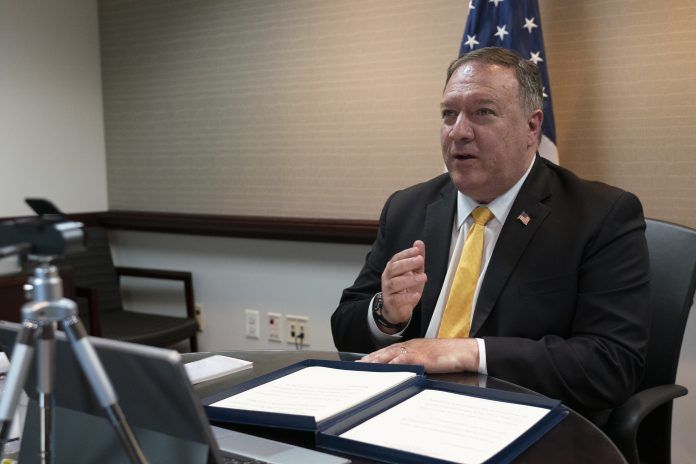By Michelle Nichols
NEW YORK, June 30 (Reuters) – U.S. Secretary of State Mike Pompeo pushed the U.N. Security Council on Tuesday to extend an arms embargo on Iran before it expires in October, prompting Russia to slam Washington’s policy toward Tehran as like “putting a knee” to the country’s neck.
Earlier this month, the United States circulated a draft resolution on the measure to the 15-member council, but council veto-powers Russia and China have already signaled their opposition to the move.
Pompeo argued that Iran is not a “responsible democracy” and must be held accountable.
“Don’t just take it from the United States, listen to countries in the region. From Israel to the Persian Gulf, countries in the Middle East – who are most exposed to Iran‘s predations – are speaking with one voice: Extend the arms embargo,” Pompeo told a virtual Security Council meeting.
U.S. President Donald Trump’s administration has long argued that the arms embargo on Iran should not be lifted. The arms embargo is set to end in mid-October under Tehran’s 2015 nuclear deal with Britain, Germany, France, China, Russia and the administration of Trump’s predecessor, Barack Obama.
Since Trump took office in 2017, his administration has quit the nuclear deal and steadily ramped up sanctions on Iran in what Washington describes as a maximum-pressure approach.
Addressing the council, Russia’s U.N. Ambassador Vassily Nebenzia described the policy as “a maximum suffocation policy.”
“The task is to achieve regime change or create a situation where Iran literally wouldn’t be able to breath. This is like a putting a knee to one’s neck,” he said in a veiled reference to the death of a Black man in Minneapolis after a white police officer knelt on his neck for nearly nine minutes. The death of George Floyd sparked protests across the United States and around the world.
The Security Council was meeting on Tuesday to discuss the latest report by U.N. Secretary-General Antonio Guterres on the implementation of the arms embargo and other restrictions still in place under the nuclear deal.
Guterres’ report said that cruise missiles used in several attacks on oil facilities and an international airport in Saudi Arabia last year were of “Iranian origin.”
If Washington is unsuccessful in extending the arms embargo, it has threatened to trigger at the Security Council a return of all U.N. sanctions on Iran under the nuclear deal, even though it left the accord in 2018. Diplomats say Washington would face a tough, messy battle.
Iran has breached parts of the nuclear deal in response to the U.S. withdrawal and Washington’s reimposition of sanctions.
U.N. political affairs and peacebuilding chief Rosemary DiCarlo said the nuclear deal was crucial to regional and international security, adding: “It is therefore regrettable that the future of this agreement is in doubt.”
Britain, France and Germany all expressed concern to the council that lifting the arms embargo on Iran would have major implications for regional security and stability. However, they also said they would not back U.S. efforts to unilaterally trigger a return of all U.N. sanctions on Iran.
(Reporting by Michelle Nichols; editing by Jonathan Oatis)


